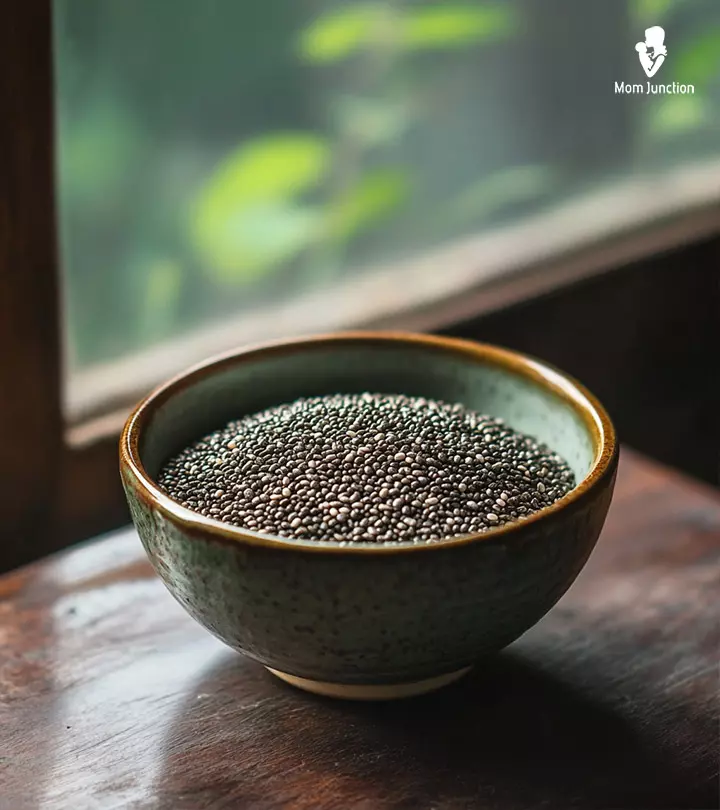
Image: Shutterstock
Strep throat or streptococcal pharyngitis is a painful throat infection caused by group A Streptococcus bacteria (1). It causes inflammation and swelling of the lymph nodes and tonsils and can pass to others. Hence, if you contract strep throat when breastfeeding, you may want to know if the infection can pass on to your lactating baby.

Strep infection in babies is uncommon, though it is possible to acquire it. Hence, precautions should be taken if a nursing mother contracts the infection.
Read on to learn if you can breastfeed if you have a strep throat infection, the precautions to take during the lactation period, and some home remedies to help manage and cure strep throat effectively.
Key Pointers
- Strep throat is a painful bacterial infection that can cause swollen lymph nodes, fever, and a sore throat, which can occur during breastfeeding.
- Mothers can still nurse their babies if they follow specific precautions, such as frequently washing their hands and using a face mask while nursing.
- Breastfeeding women with strep throat should take medications, including antibiotics, in the prescribed dosages and for the specified duration as advised by a medical professional.
- Home remedies such as salt water gargles, a healthy diet, sufficient hydration, and steam inhalation can significantly alleviate the symptoms.
Is It Safe To Breastfeed While Having Strep Throat?

Yes. You may continue to breastfeed your baby as usual, even if you have a strep throat infection. Breast milk contains antibodies. As a mother’s body produces antibodies against strep throat infection, they may be passed on to the baby through breast milk.
The Canadian Breastfeeding Foundation says (2), “Breastfeeding protects the baby against infection, and the mother should continue breastfeeding, in order to protect the baby. If the baby does get sick, which is possible, they are likely to get less sick than if breastfeeding had stopped. ”
The US Centers for Disease Control and Prevention states that breast milk protects babies against several respiratory diseases (3). Therefore, a mother should continue to breastfeed unless instructed by a doctor against nursing. However, you need to take precautions that the infection is not spreading to the baby through other modes.
Precautions While Breastfeeding With A Strep Throat
Strep throat is a contagious bacterial infection. Nursing mothers with strep throat need to observe a few precautionary measures to negate the chances of spreading the infection to their little ones (4).
- Maintain hygiene by washing your hands thoroughly before breastfeeding your baby.
- Avoid kissing or cuddling them.
- Use a face mask while breastfeeding.

- Cover your mouth and nose with a tissue or handkerchief when sneezing or coughing. Tissue papers can be disposed of, and thus may be preferred over a handkerchief.
- If your symptoms worsen or new ones appear, talk to your doctor early to help avoid complications.
 Point to consider
Point to considerTreatment For Strep Throat When Breastfeeding
Strep throat is treated with antibiotics.
- Amoxicillin or penicillin is commonly prescribed for treating strep throat. However, the effects of maternal doses of penicillin on a breastfeeding baby are unknown (5).
- The antibiotic amoxicillin is considered safe to administer to a nursing mother. The American Academy of Pediatrics considers amoxicillin compatible with breastfeeding since the maternal dosage is not known to cause any effect on the infant (6).
 Quick fact
Quick fact- The mother may consider having ibuprofen for relief from pain and fever. Ibuprofen is considered safe to administer while breastfeeding (7).

Remember, never self medicate for strep throat while breastfeeding. You should have medicines only when prescribed by the doctor and as per the doctor’s instructions. Medicines may have side effects, and you may discuss them with your doctor.
Your pediatrician or doctor may prescribe you a safe antibiotic other than amoxicillin. If you have a strep throat infection, but without symptoms or the symptoms do not cause you significant discomfort, then the doctor may not prescribe any medication. You can follow some measures at home for optimal recovery and good maternal health.
Home Remedies For Strep Throat
Home remedies may be followed with or without medication. Below are some home remedies that may help alleviate the discomfort caused by strep throat.
- Rest and care: Sound sleep and proper rest may help reduce the discomfort caused by a strep throat.
 Quick tip
Quick tip- Saltwater gargling: Gargling with lukewarm salt water (about half-a-teaspoon salt in a cup of lukewarm water mixed well) may reduce inflammation and lead to throat pain relief.
- Steam inhalation: This may help alleviate throat dryness and congestion.

- Humidifier: The use of a cool-mist humidifier may help reduce irritation in the throat.
- Keep yourself hydrated: Strep throat may make it difficult to eat or swallow food. Not drinking sufficient fluids may increase the risk of dehydration. Keep your body well-hydrated by drinking lukewarm water, vegetable soup, warm milk, and similar healthy fluids throughout the day. Liquids are also more likely to be easy to swallow than solids.
- Choose your diet: Acidic food, citrus fruits, and spicy foods while breastfeeding may aggravate the strep throat and are best avoided. Instead, pick nutritious and soothing foods such as oatmeal, mashed potatoes, vegetable or meat broth, applesauce, smoothies (fruits as well as vegetables), and eggs (boiled or scrambled) as they are good for your immune system.

- Throat lozenges: You may consider having over-the-counter non-medicated throat lozenges. You may ask your doctor to suggest appropriate throat lozenges.
Frequently Asked Questions
1. What happens if a newborn gets strep throat?
Babies are rarely treated for strep throat, caused by the bacterium Streptococcus pyogenes. Even if your newborn has strep bacteria in their mouth, they will not require antibiotic treatment because strep bacteria cannot cause serious infection in babies (8).
2. Can a mother pass strep throat to her baby?
Yes. While giving birth, a mother can transmit the strep bacteria Group B streptococcus (GBS) to her baby through her genital tract (9).
3. How do I know if my infant has strep throat?
While an infant with Streptococcus pyogenes strep throat may experience fever and no other significant complications, a baby with GBS may experience symptoms such as decreased movement of an arm or leg, pain with movement of an arm or leg, fever, redness on the face and other body parts, and breathing difficulties (9).
4. Will strep throat go away on its own in babies?
In babies below three years, strep throat may get resolved independently without any medical intervention. However, those suffering from GBS infection need to be admitted to the newborn intensive care unit (NICU) for prompt treatment depending on the complication (8) (9).
5. Why did I get a sore throat while breastfeeding?
Sore throat is caused because of viruses, bacteria, allergies, or in some cases, even smoking (11). There are no scientific reasons given as to why you may have gotten a sore throat while breastfeeding. It simply could be a sign of a cold or flu.
If you are suffering from strep throat while breastfeeding, do not worry. Although its contagiousness cannot be ignored, simple treatment with antibiotics after a doctor’s consultation can help manage the condition and your health. Since breast milk contains antibodies, your baby will have natural protection, so you need not stop nursing due to strep throat. However, you must follow certain precautionary measures to prevent transmission of the infection to your baby through your milk supply. Covering your mouth while nursing or refraining from kissing your baby during the infection can help prevent the spread.
Infographic: Effective Home Remedies To Treat Strep Throat In Lactating Mothers
Strep throat is a common bacterial infection that may affect breastfeeding mothers. While mothers need to continue breastfeeding their infants during this time, some precautions should be taken to prevent the spread of the infection. Explore some home remedies for treating it in the infographic below.
Some thing wrong with infographic shortcode. please verify shortcode syntax
Illustration: Home Remedies To Treat Strep Throat While Breastfeeding

Image: Dall·E/MomJunction Design Team
Figure out effective natural home remedies for treating strep throat while breastfeeding. Learn techniques to alleviate throat discomfort and safeguard your baby’s well-being.
References
1. About Group A Strep Infection; Centers for Disease Control and Prevention (CDC)
2. Breastfeeding and Illness; Canadian Breastfeeding Foundation
3. Influenza (Flu) and Breastfeeding; Centers for Disease Control and Prevention (CDC)4. Strep Throat; University of Michigan
5. J L Mathew, Effect of maternal antibiotics on breast feeding infants; BMJ Journals
6. The Transfer of Drugs and Other Chemicals Into Human Milk; American Academy of Pediatrics
7. Ibuprofen; LactMed, National Center for Biotechnology Information
8. Can infants get strep throat?; HealthyChild.org; American Academy of Pediatrics
9. Group B Streptococcus Infection in Babies; Cedars-Sinai
10. Robert M. Lawrence; Transmission of Infectious Diseases Through Breast Milk and Breastfeeding; Elsevier Public Health Emergency Collection (2011)
11. Sore Throat Basics; Centers for Disease Control and Prevention (CDC)
Community Experiences
Join the conversation and become a part of our nurturing community! Share your stories, experiences, and insights to connect with fellow parents.
Read full bio of Melissa Kotlen
Read full bio of Swati Patwal
Read full bio of Rohit Garoo
Read full bio of Shinta Liz Sunny
















